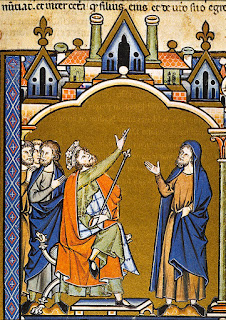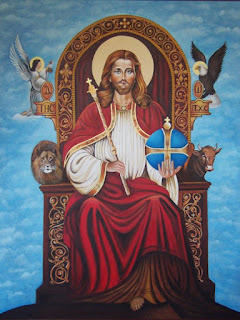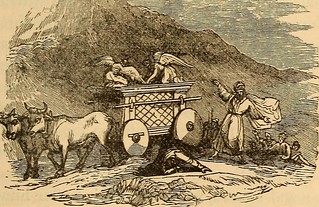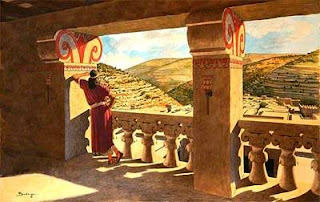"... the Lord had given [David] rest, on every side, from all his enemies." (2 Samuel 7:1)
"... my people Israel... shall be disturbed no more..." (2 Samuel 7:10)
"... I will give thee rest from all thy enemies." (2 Samuel 7:11)
The first item of note in 2 Samuel 7 is the theme of peace that runs throughout. David has repeatedly and soundly defeated the Philistines, so that that neighboring nation appears to no longer be a threat. He has secured the central city of Jerusalem as his capital, a symbolic gesture as much as anything that helped to unite the southern and northern tribes. And he has had the Ark of the Covenant brought from its obscure place to the capital to be housed in a forthcoming grand temple. And God makes it clear in this chapter that He has made all these things possible and is now granting Israel a period of peace. It must have been quite a feeling of relief and gratitude among the Israelites during this time. Though Israel's foray into monarchy was rough at first (and as already stated, not desired by God), it seems at this point God has allowed them a time of peace and prosperity and has permitted this royal arrangement to not only endure but to flourish. And as so often is the case with God, He takes a situation that has been corrupted by man's sinfulness and brings something good out of it. In this case, God uses the monarchical arrangement to reveal to us a model of the eternal kingdom that will be established by His Son Jesus Christ. And that leads us to the most significant facet of 2 Samuel 7: God's covenant with David and its prefiguring of the new and eternal covenant of Jesus Christ.
Through the prophet Nathan, God reveals to David the following prophecy:
"And when thy days shall be fulfilled, and thou shalt sleep with thy fathers, I will raise up thy seed after thee, which shall proceed out of thy bowels, and I will establish his kingdom.
He shall build a house to my name, and I will establish the throne of his kingdom for ever.
I will be to him a father, and he shall be to me a son: and if he commit any iniquity, I will correct him with the rod of men, and with the stripes of the children of men.
But my mercy I will not take away from him, as I took it from Saul, whom I removed from before my face.
And thy house shall be faithful, and thy kingdom for ever before thy face, and thy throne shall be firm for ever." (2 Samuel 7:12-16)
This is a divine covenant. Just as God made a covenant with Moses, Abraham, Noah, and even Adam, God is here making a covenant with David! But this covenant is markedly different. The Davidic covenant is, first of all, the last covenant made before the coming of Jesus Christ. It is also the only covenant to mention a "kingdom" -- a kingdom that God intends all people, not just Jews, to be part of. And before I go any further I must give credit now for what follows to Scott Hahn, whose book Reasons to Believe was eye-opening for me, especially as it concerned the importance of David and his kingdom.
Hahn explains how the prophecy of Nathan here in 2 Samuel 7 (as well as many of the Psalms and other passages of Scripture) is referencing Jesus Christ just as much as it is Solomon, David's heir. Of course directly speaking the prophecy foretells the greatness of David's kingdom, or his "house," under his son Solomon; how God will love Solomon as a son; how a great temple will be built in which the Ark containing God's Holy Presence will reside; and how God will preserve the kingdom "for ever." Solomon of course did indeed build a colossal temple, and his kingdom enjoyed prestige and success far and wide for a long time. But as we know from history, it did not last forever (at least, not in the way the Jews of the time had hoped). And that leads to Hahn's main point. David's kingdom was never meant to be an earthly kingdom forever. It was indeed meant to be everlasting, but not in a material sense. David's heir beyond Solomon would one day be the God Man Himself, Jesus Christ, whose kingdom would be heavenly and the truly eternal kingdom spoken of by Nathan. The kingdom would be the Church established by Jesus in the New Testament. It's why Jesus is called over and over in Scripture "Son of David." Just look at the words of St. Luke at the beginning of his Gospel. He says of Jesus: "He shall be great, and shall be called the Son of the most High, and the Lord God shall give unto him the throne of David, his father: and he shall reign in the house of Jacob for ever. And of his kingdom there shall be no end" (Luke 1:32-33). Scott Hahn writes, "The dynasty of David would never end. Dynasties rise and fall in all other earthly monarchies, but the throne of David would always be occupied by a descendant of David himself." As Luke states (and as it's recorded elsewhere in the Gospels), Jesus is a descendant of David, he is the descendant, the one who will fulfill Nathan's prophecy, who will reveal what God really meant when he blessed David's kingdom and declared it to be an eternal kingdom. It's the only way Nathan's prophecy makes sense. We know that David's kingdom appeared to end when other nations came in and conquered Israel, destroyed the temple, and exiled the Israelites. But the covenant established with David by God held such power in the hearts and minds of the Israelites, that they never really abandoned hope in it. Hahn writes, "the words of the prophets held out the promise, and history recorded God's oracle through Nathan as an unconditional surety." God promised an everlasting kingdom and Israel mostly held on to that promise, even when things seemed utterly dire. The prophets of course, sent by God, helped the people to not forget the Davidic covenant. Isaiah played a large role here -- as Hahn says, "Isaiah prophesied that salvation would come with the birth of an heir to David's throne. The new king's dominion would be vast and would endure 'both now and forever' (see Isaiah 9:5-6)." All this is to say that what is happening here in 2 Samuel 7 has everlasting significance. God, through David, is establishing His kingdom, knowing that its true king, Jesus Christ, will soon be the one to assume David's throne, and that the true nature of the kingdom, that is, the Church established by Christ, will eventually be revealed to all of humankind. One more time from Scott Hahn: "The heart of Jesus' earthly ministry was the proclamation of the kingdom, and His use of that word could mean only one thing to His hearers. They understood Him to mean the restoration of the kingdom of David, and He did not contradict their expectation. In fact, He confirmed it and clarified it, never diminishing its Davidic character." This means that followers of Christ, all members of His Church, even today in the 21st century, are part of David's kingdom. Upon David's throne, Christ has elevated and invited us all, not just the Jews but all men and women of faith, to the royal table to feast with the king. The words of Nathan take on a powerfully sublime meaning when viewed in their fullest and truest sense.
One man's literary pilgrimage through the hills and valleys of the Word of God.
Saturday, March 28, 2020
Wednesday, March 25, 2020
2 Samuel 6 - Uzzah & the Disrespect
Now that David is in Jerusalem and getting ready to build a grand temple and continue the task of unifying and strengthening Israel, there remains just one more thing to be done: bringing the Ark home. We haven't heard much about the Ark lately; not since the early chapters of First Samuel when we read about the Israelites getting the Ark back from the Philistines and placing it in Cariathiarim. Since then all of the drama unfolded involving King Saul and the transition of power to David. Now that political uncertainty has settled down, attention can once again be payed to this holiest object in the Israelites' possession. The Ark ought to be placed in a prominent, central location, and that is just what David intends to do. The problem, however, as we see in 2 Samuel 6, is that the Israelites, probably because of years being apart from the Ark or forgetting the proper injunctions surrounding it, do not handle it with due respect. This is all illustrated quite powerfully through the figure of Uzzah. Uzzah of course is the poor soul who is struck dead after placing his hand on the Ark, but the problems began before that fateful act. The first mistake David and the Israelites made was to place the Holy Ark of the Covenant on an old wooden cart pulled by oxen. God made clear the Ark was to be carried only by the Levites, the priestly tribe set aside by God for this and many other tasks. This rule was broken (the same way David broke a rule by taking so many wives). As was made clear throughout the law books of the Pentateuch, God desired a priestly tribe, one tribe set apart, reserved to be physically closest to Him in the Tabernacle and in handling the Ark. This rule had been chipped away at slowly over the decades and centuries. We saw Saul make the mistake of assuming certain priestly functions. We've seen it with other Biblical figures. And now we see it with Uzzah. So after transferring the Ark using these lowly, undignified means, Uzzah puts his hand on the Ark to steady it, and is struck dead on the spot. For David it is a wake-up call. Clearly David realizes the mistake they made and immediately has the Ark taken to the home of the Levite Obed-edom. Here God seems to be appeased. Blessings come to Obed-edom for his respectful treatment of the Ark, and it is then allowed to continue its journey to Jerusalem.
The importance of the priests' role seems to be an important theme in this chapter. It's stressed over and over in Scripture that God has strict instructions concerning His worship and He desires them to be followed, not casually shrugged off whenever we feel like it. It's a mark of humility, a virtue much lauded by Our Lord, to submit to His injunctions, both then and now. Today we have, for example, the casual handling of the Blessed Sacrament by means of "extraordinary ministers" of the Eucharist or Communion in the hand, and so on. Clearly these are not the most reverent and respectful ways we could be handling Our Lord. Let us learn from Uzzah and adhere to the strictest reverence when it comes to God's True Presence.
The importance of the priests' role seems to be an important theme in this chapter. It's stressed over and over in Scripture that God has strict instructions concerning His worship and He desires them to be followed, not casually shrugged off whenever we feel like it. It's a mark of humility, a virtue much lauded by Our Lord, to submit to His injunctions, both then and now. Today we have, for example, the casual handling of the Blessed Sacrament by means of "extraordinary ministers" of the Eucharist or Communion in the hand, and so on. Clearly these are not the most reverent and respectful ways we could be handling Our Lord. Let us learn from Uzzah and adhere to the strictest reverence when it comes to God's True Presence.
Tuesday, March 24, 2020
2 Samuel 3-5: David, King!
After a bumpy start, the beginning of David's kingship finally is able to flourish in these chapters. Ish-bosheth, Saul's son and rival claimant to the throne, is killed in chapter 4. In chapter 5 there are no more hurdles for David to clear; God's anointed one can finally assume his destined position as king of all of Israel. And chapter 5 just feels different. There is something grandiose about it. It's the first time Solomon's name is mentioned; there is a prevalent theme of unity; the Philistines are soundly defeated over and over; Israel's power as a nation grows; and the Holy City of Jerusalem, after hundreds of years of being occupied, is finally taken away from the Jebusites. This last event seems to be the most dramatic and significant. When King David takes Jerusalem, he is quick to make it his capital. He begins designs for a great temple atop Jerusalem's commanding hill. In every sense, symbolically and actually, Israelite power is growing and consolidating throughout this chapter and I'd imagine in the many chapters to come. In many ways it is the culmination of events started back in Joshua's days -- Israel's enemies, within and without, are being swept aside and God's promise that the land of Canaan will be theirs seems to finally be becoming a reality in the fullest sense. Although, as a side note, there is a subtle notion in this chapter that all may not be well for long. Moses had foreseen that God would one day permit a king to rule over His people, even though it wasn't what He ideally wanted, and he had written in Deuteronomy 17:17, "[the king] shall not have many wives, that may allure his mind, nor immense sums of silver and gold." Yet, in 2 Samuel 5:13 it is written, "And David took more concubines and wives of Jerusalem, after he was come from Hebron: and there were born to David other sons also and daughters." (One of those sons was of course Solomon, who infamously followed in his father's footsteps in this area.) The point is that David wasn't perfect and this aspect of his kingship, which went against the Mosaic covenant, displeased God. While David's reign may have been full of glory and triumph, it would not last forever. Israel's golden years would be thus short-lived.
Subscribe to:
Posts (Atom)



